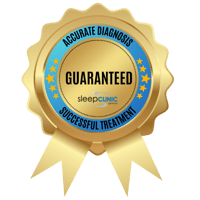10 Fascinating Facts About Sleep Apnea

Obstructive sleep apnea (OSA) is a serious sleep disorder characterised by repeated pauses in breathing during sleep. These pauses can happen hundreds of times a night, seriously disrupting your sleep and reducing your blood oxygen to unhealthy levels.
The impact of OSA on daily functioning can be significant, affecting cognitive performance, mood, and overall health - but, let’s take a look at some of the lesser-known realities of obstructive sleep apnea (OSA).
In this article we’ll go through some of the surprising complexities of obstructive sleep apnea - from unexpected impacts on brain health to startling links with cancer, and beyond.
- 1 in 5 adults have obstructive sleep apnea to some degree, and it affects both men and women across all age groups. It’s more common in men and older adults, but factors like weight and pre-existing conditions can also impact the prevalence of the condition.
- Despite its prevalence, up to 80% of cases of sleep apnea are undiagnosed. Many people don't realise they have OSA because it only occurs during sleep. Many symptoms of OSA, such as waking tiredness, daytime sleepiness, fatigue, lethargy and high blood pressure are blamed on other factors and causes.
- Not everyone who snores has sleep apnea, but almost everyone with OSA snores. Loud, persistent snoring is the most common warning sign of OSA. But a small proportion of apnea sufferers do not snore, they are known as ‘silent apneics’. This is actually worse, because people notice a snorer stopping when they have an apneic event, whereas a silent apneic does not get noticed.
- People with untreated sleep apnea are seven times more likely to be involved in a car accident than those without the condition. OSA leads to fragmented and poor-quality sleep, resulting in excessive daytime sleepiness and fatigue. Because of this, people with OSA may experience microsleep episodes - brief moments of unintentional sleep that they are unaware of. . Sleep apnea leads to excessive daytime sleepiness, impaired alertness, and slowed reaction times while driving, making individuals with OSA more prone to errors and accidents.
- Apnea affects your driver's licence. Under Australian law, conditions which impact on your ability to drive safely must be notified to the licensing authorities. ‘Notifiable conditions’ include epilepsy, blindness, multiple sclerosis, heart disease and apnea. When the condition is being effectively treated, conditional licences are granted, for private and commercial drivers and pilots.
- OSA can lead to alterations in brain structure and function. Ongoing research is investigating the extent of this, but a recent study discovered that individuals with OSA experienced a breakdown in the structural integrity of brain areas associated with behaviours and bodily functions. These deficiencies were observed in multiple brain regions and suggest harm caused by decreased oxygen levels, oxidative stress, persistent inflammation, problems with small blood vessels, and localised blood supply issues. These changes accumulate over extended periods. OSA sufferers must prioritise protective measures to prevent further neural damage.
- Obstructive sleep apnea (OSA) increases the risk of sexual dysfunction, particularly in men. The repeated interruptions in breathing and reduced oxygen levels during sleep impact hormone production and cardiovascular health, both of which play crucial roles in sexual function. For men, OSA has been associated with a higher likelihood of erectile dysfunction (ED), in women OSA can have a negative effect on libido.
- Those with moderate to severe OSA are two and a half times more likely to develop cancer and three times more likely to die from cancer. Research indicates that severe and untreated OSA is linked to an elevated risk of developing certain cancers. The connection is thought to be related to factors such as intermittent hypoxia (reduced oxygen levels due to breathing interruptions during sleep) and inflammation, which are characteristic features of OSA. Interestingly, 80 percent of head and neck cancer patients also have sleep apnea. However, it's important to note that the precise nature of this relationship and the mechanisms behind it are still being investigated.
- Emerging evidence links disrupted sleep to a heightened risk of dementia and Alzheimer’s disease. This association is further reinforced by the growing body of research connecting sleep-disordered breathing (SDB) to cognitive decline in older adults. Studies suggest that untreated sleep apnea might elevate the risk of developing Alzheimer's disease or other forms of dementia, with research revealing a 26% increase in cognitive impairment associated with sleep apnea. Additionally, there's a notable presence of beta-amyloid, a key protein linked to Alzheimer's development, in the brains of those affected by sleep apnea.
- People with severe or untreated OSA are twice as likely to have a heart attack. One of the biggest dangers of untreated sleep apnea is its significant impact on your heart and your blood vessels (arteries, veins and capillaries). Those with OSA are also five times more likely to develop heart disease, and four times more likely to have atrial fibrillation (which causes irregular heartbeats).
...and a bonus fact: - There can be a correlation between sleep apnea and hearing loss. Researchers are exploring how reduced oxygen levels during apnea events could affect the inner ear, potentially contributing to hearing impairment. Untreated sleep apnea might also even contribute to certain eye conditions, such as glaucoma, due to increased pressure in the eyes during apnea events. Even the partners of persistent, loud snorers experience some hearing loss, specifically in the ear closest to their partner!
The Care You Need, When You Need It
The far-reaching impacts of obstructive sleep apnea should not be ignored. Left untreated, OSA and its side effects and consequences inevitably worsen. That's why it’s so important to seek diagnosis and treatment as soon as possible. You can use this free online tool to see what your risk profile is.
If you need help, Sleep Clinic Services specialises in the accurate diagnosis and successful treatment of OSA. Our expert team is here to guide you through each step of the process from home-diagnosis, to gold-standard treatment.
Sleep Apnea Diagnosis: We deliver the equipment straight to your door (anywhere in Australia) - quick and easy! And no need for any uncomfortable visits to a sleep lab…
Personalised Treatment Plans: If treatment is needed, we'll create a tailored treatment plan just for you, which may include lifestyle changes, CPAP therapy, surgical intervention or other alternatives.
It's not just about improving your sleep quality; it's about securing your long-term health. Click here to schedule a free screening call or here to submit a query and we will get back to you.
The care you need, when you need it. Sleep Clinic Services’ unique and acclaimed patient-first approach guarantees you get the results you need.

What's it like getting a sleep study with Sleep Clinic Services?


















Care you can trust. For over a decade, Australia's best provider.

Get in touch
Are you ready to reclaim peaceful restorative sleep?
Wherever you are, we can help.
As Australia's leading provider of telehealth screening, diagnosis and solutions for 'sleep disordered breathing' sufferers, we care for people all around Australia.
Questions?
Call during business hours or fill in the form and we'll call you back at the time you choose. No cost, no obligation.


